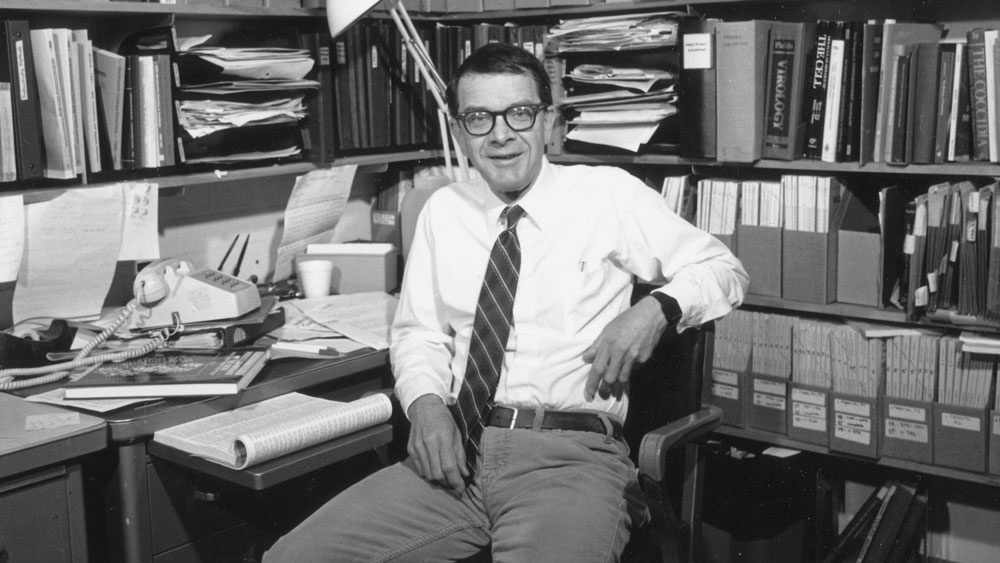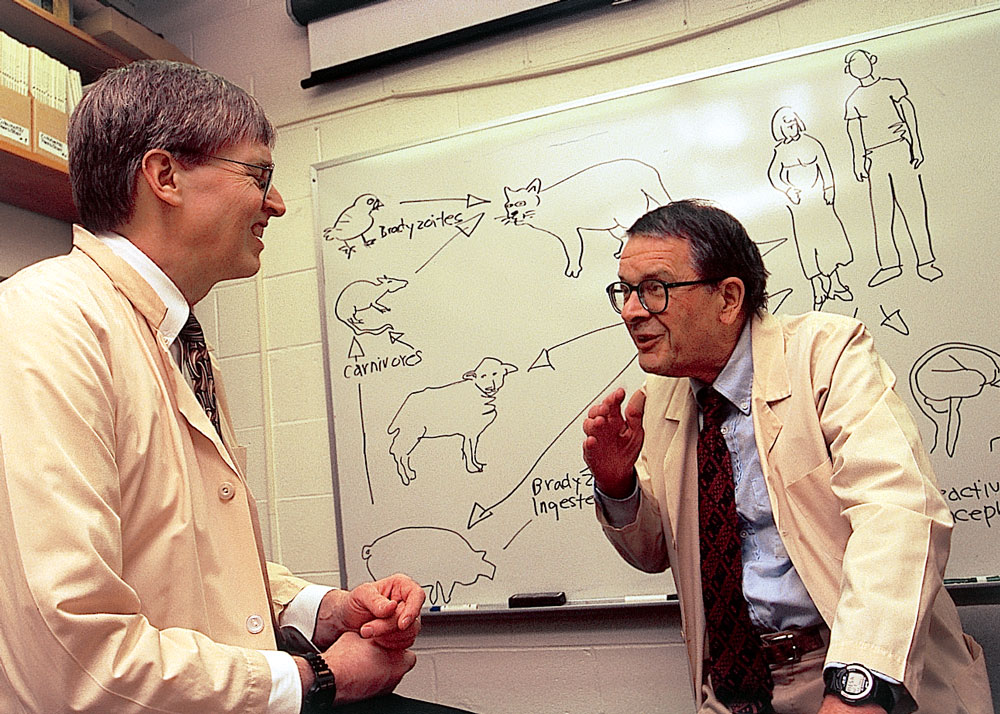
Elmer R. Pfefferkorn, PhD, emeritus professor of microbiology and immunology, and chair of the department from 1980-1992, died on March 25, 2019. He was 87 years old. He is survived by his wife, Lorraine Pfefferkorn, PhD (Guarini ’85), his research partner for 12 years.
“Elmer was the quintessential scholar-teacher. He was an esteemed researcher who made important discoveries that led to vaccines to prevent parasite infections. In the classroom, he had a remarkable ability to engage students in both the scientific and humanistic elements of infectious disease and medicine,” says Geisel School of Medicine Dean Duane Compton, PhD. “I will greatly miss his favorite salutation of ‘good day!’"
Known for his dry wit and deep love of microbiology, the legendary teacher enthralled medical students with his lectures and spellbinding stories for more than 45 years—winning 15 teaching awards. A story in the 2008 spring issue of Dartmouth Medicine magazine, “An Amazing Human Being,” begins, “When Dr. Elmer Pfefferkorn talks, Dartmouth medical students listen.”
A five-time winner of Geisel’s top teaching prize presented by each graduating class, former students still recall Pfefferkorn’s ability to make complicated concepts easily understandable and interesting. His enthusiasm, generosity, and mentorship inspired many students to enter the field.
But as much as he loved teaching, medical research was his first love. On a Rhodes Scholarship to study medicine at Oxford, he fell hard for research while working in the lab of an eminent bacteriologist who discovered the mechanism of how sulfonamides work against bacteria. His thesis on the genetics of bacteriophages—viruses that infect bacteria—earned him a PhD from Harvard Medical School.
Uninterested in competing with fellow scientists for ideas and recognitions, he was quick to share ideas and offer advice with fellow scientists both at Dartmouth and elsewhere.
Pfefferkorn is internationally recognized for his contributions to parasitology and virology, particularly for his pioneering research on Toxoplasma gondii, which he had long studied. T. gondii, a protozoan parasite, grows inside cells of mammals, including humans, and birds and is spread through feces. His early research led to the development of a vaccine to prevent the parasite’s growth in cats—blocking one pathway to human infection. Toxoplasmosis can cause neurological damage in unborn children because of its ability to pass through the placenta.
An avid reader, Pfefferkorn was also a passionate book collector who amassed an extensive general library in addition to Elizabethan translations in first editions and 19th century books on British Arctic explorations. He once playfully noted one of the reasons he came to Dartmouth was because of his interest in the private collection of Vilhjalmur Stefansson. Pfefferkorn visited the noted Arctic explorer and one-time director of polar studies at Dartmouth in Hanover to talk with him and to see his vast collection of books, photos, and manuscripts on scientific exploration. Stefansson’s collection is now housed in the college’s Baker Library.

David J. Bzik, PhD, a professor of microbiology and immunology at Geisel, recalling his early days in the department, says, “I remember a time when I was starting out in the microbiology department and tackling the many challenges of looking at the malaria parasite. Elmer would look me directly in the eye and ask, ‘How is my young parasitology colleague?’ Elmer was a wonderful colleague and he cheerfully mentored many scientists at Dartmouth and elsewhere. His work on Toxoplasma gondii shone a bright torch on this amazing parasite that lured many excellent investigators into a field that will sorely miss him.”
William R. Green, PhD, is the Elmer R. Pfefferkorn Professor of Microbiology and Immunology—established in 2009 to honor Pfefferkorn. “From my first day at Dartmouth after being recruited by Elmer and Mike Fanger, I felt fully supported as I progressed through my early career here, including the critical transition from assistant to associate professor,” Green recalls. “Elmer had this great instinct about all phases of science and career development, including what was crucial to success. Although I didn’t realize at the time that this was going to be a good thing for me, I won’t forget the day Elmer, with typical wry humor, announced to me that I would be teaching the lectures covering the Mycobacteria causing TB and leprosy. AND I would ENJOY it! As an immunologist, I wasn’t so sure, but Elmer proved he had the insight to what I needed to do to expand my breadth of understanding on the subject in order to be promoted. I am honored to hold the endowed professorship in his name.”
Paul Guyre, PhD, active emeritus professor of microbiology and immunology, describes Pfefferkorn as “the most incredible scientist, teacher, and inspiring role model one could ever hope to know. He consistently received perfect scores on his NIH grant applications, and to this day I use his seminal 1984 PNAS paper to impress upon new students how important it is to be fastidious and meticulous.
“I recall his stringent attention to experimental detail, which was vital for his seminal discovery of the mechanism by which interferon protects cells against Toxoplasma infection. He observed that interferon protects cells grown in one type of culture medium (called MEM) but not another (called DMEM). When he compared the formulae he noted (with an ‘Aha!’) that supplemental iron found in DMEM, but not MEM, must account for the difference. Alas, the concentration of iron proved unimportant, and the key was 16 mg/liter tryptophan in DMEM vs. 10 mg/liter in MEM. He showed how a tiny change in a single molecule can make an all-or-none difference in the life or death of a parasite and the human cells it likes to invade.”
David Leib, PhD, a professor and chair of the Department of Microbiology and Immunology, says when he arrived at Dartmouth in 2009 and was asked to teach virology, he sought advice on how best to approach his lectures. “I was given a CD of Elmer’s lecture on polioviruses, vaccination, and viral transmission. I popped the CD into my laptop and began listening. I was immediately mesmerized by his raconteur yet economical style of lecturing, the precision timing of his delivery, and the silence of the students in the room! My next reaction was complete intimidation at having to assume the lectures of such an outstanding teacher. He was a role model to all students and faculty at Dartmouth. I always enjoyed my cheerful interactions with him. He was one of a kind.”
“This is so sad—Elmer was a legendary teacher for generations of medical students. His teaching was so clear, engaging, and memorable,” says former Pfefferkorn student Joe O’Donnell, MED ’71, active emeritus professor of medicine and of psychiatry at Geisel. “I don’t think any student ever has forgotten his narratives about the hero of the day—people who helped solve the greatest infectious disease problems of the past by applying the scientific method. He was also an incredible mentor for students and colleagues, some of whom became world renowned scientists, but all benefitted by being around this humble and very gifted man. He left an incredible legacy especially among the legions of aspiring doctors and scientists whom he inspired through his teaching and compassion. Dartmouth and the world lost a giant.”
Joseph Schwartzman, MED ’72, an emeritus professor of pathology and laboratory medicine at Geisel and also one of Pfefferkorn’s former students, recalls the man who brought the study of intracellular protozoan parasites into the era of modern biology by recognizing the advantages of the cosmopolitan parasite Toxoplasma gondii as a model system. “He is revered by the multitude of researchers who have capitalized on his groundbreaking, beautifully written publications,” he says. “Elmer was a superb communicator, he could explain almost anything to almost anybody—this made him the best lecturer of my experience. My medical school class always would show up to hear whatever he might be discussing. This remained true until his final class. He set an almost unattainable standard both in research and teaching.”
And from the dedication in the 2007 edition of “Toxoplasma Gondii, The Model Apicomplexan: Perspectives and Methods”—"We would like to dedicate this book to Elmer Pfefferkorn PhD, Dartmouth College. Elmer’s work paved the way for the explosion in molecular biology, cell biology, and genomic research associated with this organism. Elmer’s intellectual rigour and deep thinking have had a significant influence on current researchers on Toxoplasma gondii, and we are all indebted to his generosity of spirit and profound insights into this pathogen.”
Pfefferkorn’s legacy is recognized by the endowed Munck-Pfefferkorn Prize Lecture—named in honor of Geisel School of Medicine luminaries Elmer Pfefferkorn, PhD, and Allan Munck, PhD. Both were outstanding scientists, teachers, and mentors, who inspired new generations of researchers and physicians.
And the Elmer R. Pfefferkorn & Allan U. Munck Education and Research Fund Novel and Interactive Grant Initiative was created to support research and education initiatives within the Geisel School of Medicine, particularly to provide significant support for the research initiatives deemed most likely to foster faculty interactions that will lead to novel biomedical advances and have the potential for generating ongoing support of Geisel research.
Plans for a memorial service are forthcoming.